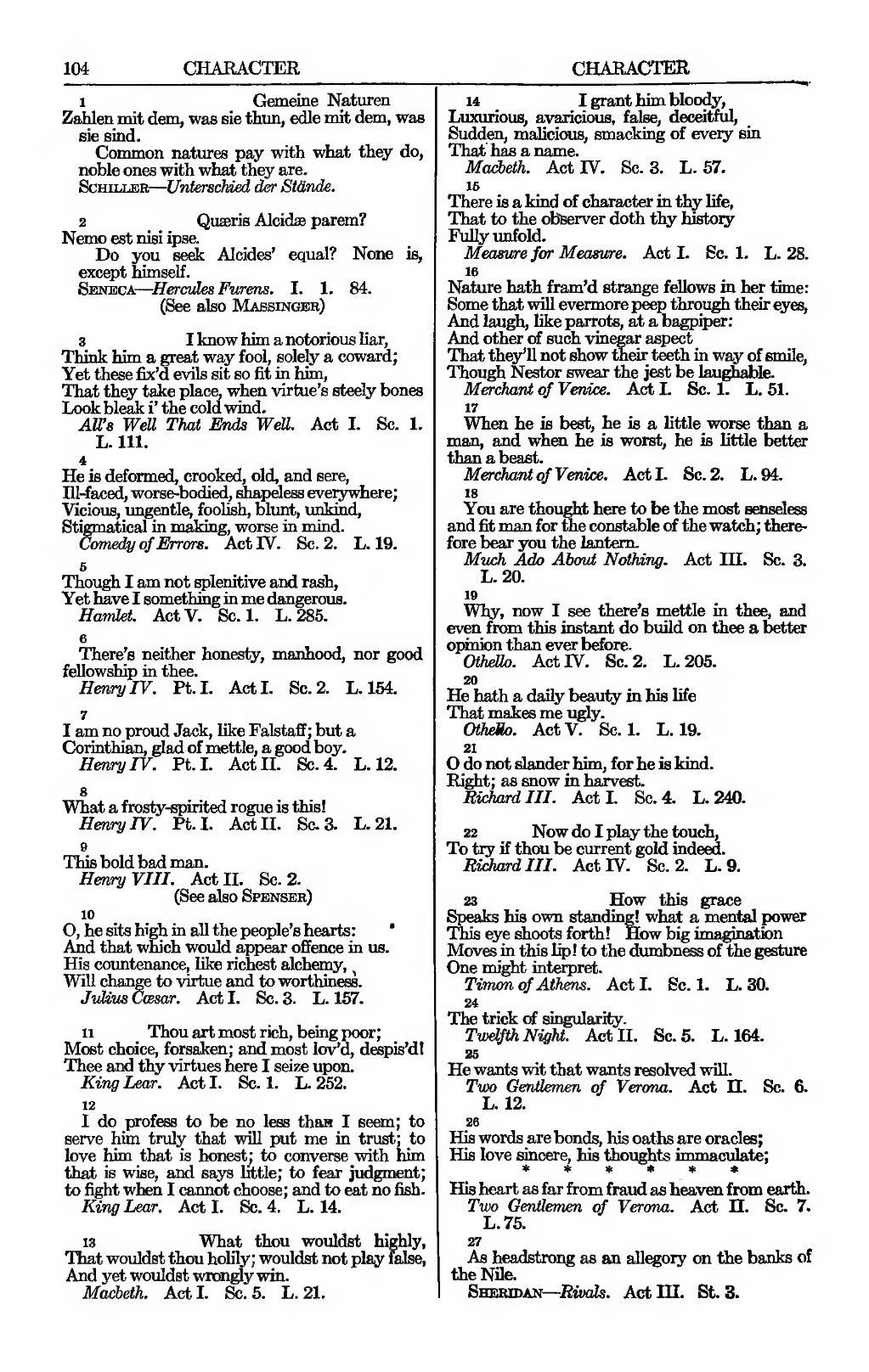Gemeine Naturen
Zahlen mit dem, was sie thun, edle mit dem, was sie sind.
Common natures pay with what they do, noble ones with what they are.
Schuxek—Unterschied der St&nde.
Quasris Alcidae parem?
Nemo est nisi ipse.
Do you seek Alcides' equal? None is,
except himself.
Seneca—Hercules Furens. I. 1. 84.
| seealso = (See also {{sc|Massingee)
I know him a notorious liar,
Think him a great way fool, solely a coward;
Yet these fix'd evils sit so fit in him,
That they take place, when virtue's steely bones
Look bleak i' the cold wind.
All's Well That Ends Well. Act I. Sc. 1.
L. 111.
He is deformed, crooked, old, and sere,
Ill-faced, worse-bodied, shapeless everywhere;
Vicious, ungentle, foolish, blunt, unkind,
Stigmatical in making, worse in mind.
Comedy of Errors. Act IV. Sc. 2. L. 19.
Though I am not splenitive and rash,
Yet have I something in me dangerous.
Hamlet. Act V. Sc. 1. L. 285.
There's neither honesty, manhood, nor good
fellowship in thee.
Henry IV. Pt. I. Act I. Sc. 2. L. 154.
I am no proud Jack, like Falstaff ; but a
Corinthian, glad of mettle, a good boy.
Henry IV. Pt. I. Act II. Sc. 4. L. 12.
What a frosty-spirited rogue is this!
Henry IV. Pt. I. Act II. Sc. 3. L. 21.
This bold bad man.
Henry VIII. Act II. Sc. 2.
| seealso = (See also Spenseh)
| topic =
| page = 104
}}
{{Hoyt quote
| num =
| text = <poem>O, he sits high in all the people's hearts: "
And that which would appear offence in us.
His countenance, like richest alchemy,
Will change to virtue and to worthiness.
Julius Caesar. Act I. Sc. 3. L. 157.
Thou art most rich, being poor;
Most choice, forsaken; and most lov'd, despis'd!
Thee and thy virtues here I seize upon.
King Lear. Act I. Sc. 1. L. 252.
I do profess to be no less thaii I seem; to
serve him truly that will put me in trust; to
love him that is honest; to converse with him
that is wise, and says little; to fear judgment;
to fight when I cannot choose; and to eat no fish.
King Lear. Act I. Sc. 4. L. 14.
What thou wouldst highly,
That wouldst thou holily; wouldst not play False,
And yet wouldst wrongly win.
Macbeth. Act I. Sc. 5. L. 21.
I grant him bloody,
Luxurious, avaricious, false, deceitful,
Sudden, malicious, smacking of every sin
That has a name.
Macbeth. Act IV. Sc. 3. L. 57.
There is a kind of character in thy life,
That to the observer doth thy history
Fully unfold.
Nature hath fram'd strange fellows in her time:
Some that will evermore peep through their eyes,
And laugh, like parrots, at a bagpiper:
And other of such vinegar aspect
That they'll not show their teeth in way of smile,
Though Nestor swear the jest be laughable.
Merchant of Venice. Act I. Sc. 1. L. 51.
When he is best, he is a little worse than a
man, and when he is worst, he is little better
than a beast.
Merchant of Venice. Act I. Sc. 2. L. 94.
You are thought here to be the most senseless
and fit man for the constable of the watch; therefore bear you the lantern.
Much Ado About Nothing. Act III. Sc. 3.
L. 20.
Why, now I see there's mettle in thee, and
even from this instant do build on thee a better
opinion than ever before.
Othello. Act IV. Sc. 2. L. 205.
He hath a daily beauty in his life
That makes me ugly.
Othello. Act V. Sc. 1. L. 19.
O do not slander him, for he is kind.
Eight; as snow in harvest.
Richard III. Act I. Sc. 4. L. 240.
Now do I play the touch,
To try if thou be current gold indeed.
Richard III. Act rV. Sc. 2. L. 9.
How this grace
Speaks his own standing! what a mental power
This eye shoots forth! How big imagination
Moves in this lip! to the dumbness of the gesture
One might interpret.
Timon of Athens. Act I. Sc. 1. L. 30.
The trick of singularity.
Twelfth Night. Act II. Sc. 5. L. 164.
He wants wit that wants resolved will.
Two Gentlemen of Verona. Act II. Sc. 6. L. 12.
His words are bonds, his oaths are oracles;
His love sincere, his thoughts immaculate;
His heart as far from fraud as heaven from earth.
Two Gentlemen of Verona. Act II. Sc. 7.
L.75.
s headstrong as an allegory on the banks of the Nile.
Sheridan—Rivals. Act III. St. 3.
